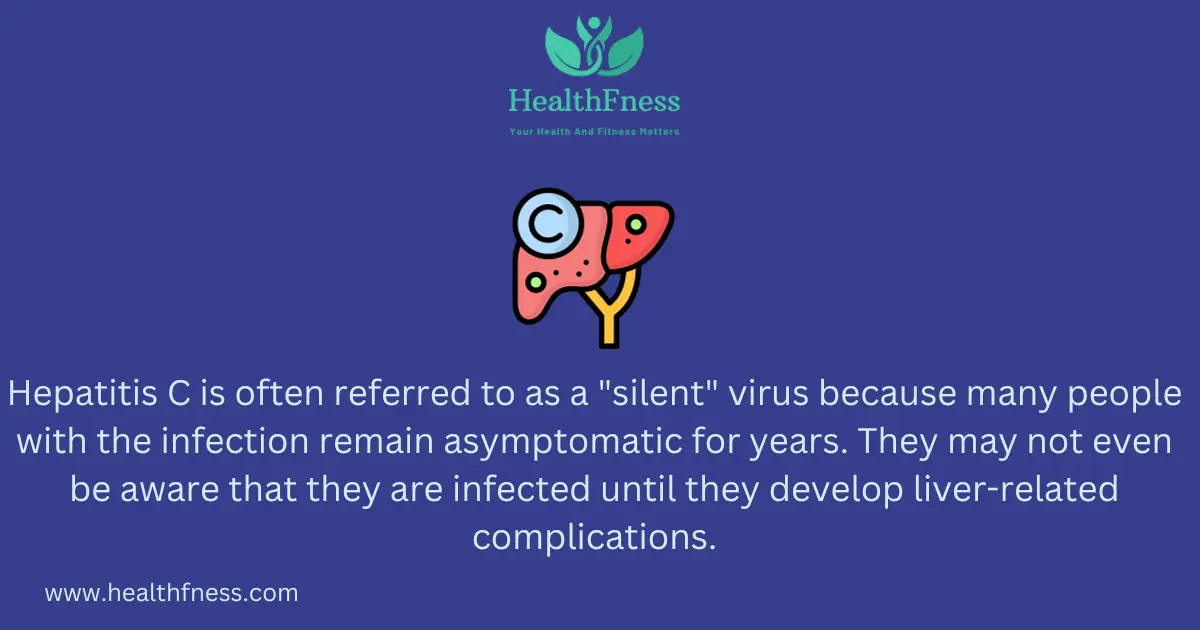Here, we’ll dive into the question: “Can you get disability for hepatitis C?”
Hepatitis C is a tricky and viral virus that affects the liver differently in each person (every person has unique symptoms).
We’ll explore what hepatitis C is, its symptoms, treatments, and whether it qualifies as a disability. We’ll also discuss how to apply for long-term disability benefits. This journey will cover important topics like gathering medical proof, understanding how hepatitis C affects your ability to work, and getting help from legal experts who know about disability claims. Let’s start this journey to understand how you might get disability benefits for hepatitis C.
What Is Hepatitis C?🩸
Let’s first understand what is Hepatitis C:
In simple words we can say Hepatitis C (HCV) is a virus that make your liver sick (Liver don’t work proplerly).
Knowing about this sickness is really important, especially if you’re trying to get disability benefits. You can find more information about it by looking up “Hepatitis C” on ↗PubMed.

Illness is a journey that leads us to unexpected places. How we navigate it defines our strength.
Symptoms of Hepatitis C🩸
It’s really important to know the signs of Hepatitis C because they can affect how you feel and do your job. Signs include
- Feeling tired
- Having yellow skin or eyes
- Stomach pain
- Feeling sick to your stomach
- Confusion or Brain Fog
- Sleep Disturbances
- Depression
- Sudden Weight Loss
- Dark Urine
These signs can range from mild to severe. If you notice them, it’s a good idea to see a doctor and consider applying for disability benefits.
Treatments for Hepatitis C🩸
Treatments for Hepatitis C are ways to help people who have the virus. There are medicines that can help get rid of the virus from the body. These treatments can vary depending on the type of Hepatitis C and how severe it is.
Here are some treatment options available for Hepatitis C:
Antiviral Medications
These drugs are specifically designed to target the Hepatitis C virus and prevent it from multiplying in the body. Examples include:
- Direct-Acting Antivirals (DAAs): These are the most commonly used medications for Hepatitis C treatment. They work by blocking the virus from replicating and can cure Hepatitis C in many cases.
- Interferons: These medications help boost the immune system’s response to the virus. However, they are less commonly used today due to the availability of more effective and better-tolerated treatments.
Combination Therapy
Some treatment regimens may include a combination of different antiviral medications to increase effectiveness and reduce the risk of drug resistance.
- Liver Transplantation: In cases where Hepatitis C has caused severe liver damage or cirrhosis, a liver transplant may be necessary. However, Hepatitis C can recur in the transplanted liver, so antiviral therapy is often continued after transplantation.
- Lifestyle Changes: Making healthy lifestyle choices, such as avoiding alcohol and certain medications that can harm the liver, maintaining a healthy diet, and getting regular exercise, can help support liver health and improve treatment outcomes.
Can I Get Medicaid If I Have Hep C?🩸
Medicaid is a state and federally financed healthcare program in the United States. Eligibility is based on a number of characteristics, such as household size, income, medical necessity, and disability status.
Having Hepatitis C alone does not automatically qualify someone for Medicaid. However, individuals with Hepatitis C may be eligible for Medicaid based on their income and other circumstances.
Medicaid provides healthcare coverage for “low-income individuals and families”, as well as certain other groups, such as “pregnant women, children, and people with disabilities.” Each state has its own eligibility criteria and rules regarding income limits, asset limits, and other requirements for Medicaid enrollment.
You May Also Like To Read: Can Castor Oil Help with Varicose Veins? Discover the Truth
Is Hepatitis B a Disability?
Depending on the severity of the illness and how it affects a person’s capacity to engage in meaningful gainful activity (employment), as specified by disability laws and regulations.
Hepatitis B itself is not always considered a disability, but the symptoms and complications it can cause may qualify individuals for disability benefits under certain circumstances.
Can You Get Disability for Hepatitis C?🩸
To qualify for disability benefits for Hepatitis C, you typically need to demonstrate that your condition significantly limits your ability to perform substantial gainful activity (SGA), which means working and earning a living. This limitation must be expected to last for at least 12 months or result in death.
The process of applying for disability benefits involves providing medical evidence to support your claim. This evidence may include documentation of your Hepatitis C diagnosis, results of liver function tests, imaging studies (such as ultrasounds or MRIs), and any other relevant medical records. You may also need to undergo a medical evaluation by a healthcare provider designated by the disability program.
In the United States, the Social Security Administration (SSA) oversees the disability benefits program. The SSA evaluates disability claims based on its guidelines, which include specific criteria for evaluating Hepatitis C. These criteria consider factors such as the
- Severity of liver dysfunction
- Symptoms
- Treatment response
- Functional limitations
To support your disability claim, it’s important to provide comprehensive medical documentation and any other relevant information that demonstrates the impact of Hepatitis C on your ability to work. Additionally, seeking assistance from a healthcare provider familiar with the disability application process or a disability advocate can help strengthen your case.
If you want to learn more about disability benefits and how you can calim it Read this.↗
Hepatitis C and Meeting the Eligibility Criteria for Social Security Disability Benefits
Hepatitis C can qualify individuals for Social Security Disability Benefits (SSDI) based on the severity of symptoms, the ability to work, and the condition’s expected duration, which should be at least 12 months. Compliance with medical treatment and alignment with the Blue Book criteria also play crucial roles in eligibility. Seeking guidance from a disability attorney can streamline the application process.
Circumstances for SSDI Benefits for Hepatitis C
To qualify for SSDI benefits due to Hepatitis C, individuals must demonstrate the severity of their symptoms, their ability to work, and that the condition is expected to last at least 12 months. Compliance with medical treatment and meeting the Blue Book criteria are essential factors for eligibility. Consulting a disability attorney can be beneficial in navigating the application process.
Seeking Social Security Disability with Hepatitis C
When applying for Social Security Disability with Hepatitis C, individuals need to showcase the severity of their symptoms, their ability to work, and the expected duration of the condition (at least 12 months). Adherence to medical treatment and meeting the Blue Book criteria are critical for eligibility. Consulting a disability attorney can enhance the chances of a successful application.
Hiring a Disability Attorney
Hiring a disability attorney is crucial when seeking Social Security Disability benefits for Hepatitis C. These professionals specialize in navigating the application process, gathering essential medical evidence, and increasing the likelihood of a successful claim.
What Is Disability Insurance, and When Are You Sick Enough to Get It?
To contemplate the intricacies of disability insurance, one must navigate the terrain of incapacity and infirmity. Disability insurance becomes a lifeline when the affliction strikes, rendering individuals incapable of labor due to ailment or debility. The determination to secure disability insurance hinges on the gravity of the malady and the individual’s self-assessment of their ability to sustain gainful employment while grappling with health adversities.
What Role Does Your Doctor Play in Your Disability Decision?
Your doctor plays a pivotal role in your disability decision by providing essential medical documentation, supporting your disability claim, and offering insights into the impact of your condition on your ability to work. Their input significantly influences the outcome of your claim.
What to Do Before and After You Leave Work Due to Disability
Before and after leaving work due to a disability, individuals should take proactive steps. Before, it’s crucial to understand disability benefits and prepare financially. After, focus on healthcare, insurance, and the transition to a disability-friendly lifestyle.
FAQS
Can Hep C patients marry?
Patients with hepatitis C can marry, yes. Hepatitis C does not offer a substantial risk through infrequent contact, such as marriage, as it is largely spread through blood-to-blood contact.
Can you still work if you have Hep C?
Depending on their level of symptomatology and their line of employment, a lot of people with hepatitis C can continue working. Prioritizing your health is crucial. You should also talk to a doctor about your ability to work.
How to Buy Individual Disability Insurance?
Individual disability insurance can be purchased by doing research on insurance companies, comparing plans, and choosing a plan that fits your requirements and price range. To make an informed choice, it is advised to consult with an insurance representative or broker.
What Is Disability Insurance, and When Are You Sick Enough to Get It?
Disability insurance offers financial assistance if a disability prevents you from working. Each policy and provider has a different cutoff point for when you are "sick enough" to qualify for disability insurance. To determine eligibility, it is advisable to speak with insurance professionals.
Conclusion
In conclusion, it might be difficult, but not impossible, to navigate the system and obtain disability compensation for Hepatitis C. Important elements in the process include gaining an understanding of the problem, getting appropriate medical care, and assembling solid medical evidence. Additionally, thinking about disability insurance and the involvement of medical experts might have a significant impact on your path.
Keep in mind that every case is different, and getting advice from a disability attorney can be very helpful. Your health and well-being should be your top objectives as you consider your alternatives for handling a disability caused by hepatitis C.

